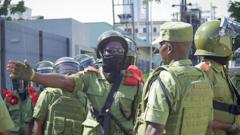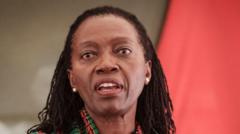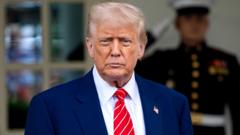The so-called United States of Kailasa, an imaginary nation promoted by a fugitive Indian holy man, faced legal repercussions in Bolivia for attempting to negotiate lengthy land leases with Indigenous groups. Accused of land trafficking, this bizarre scenario reflects ongoing tensions over sovereignty and exploitation in the region.
The Fiction of Kailasa: A Sovereign Nation's Attempt at Land Acquisition in Bolivia

The Fiction of Kailasa: A Sovereign Nation's Attempt at Land Acquisition in Bolivia
A controversial attempt by the self-proclaimed United States of Kailasa, led by a fugitive guru, to secure land leases in Bolivia unveils the complexities of identity, governance, and legality in sovereign claims.
In a bizarre intersection of spirituality and sovereignty, a self-proclaimed sovereign nation known as the United States of Kailasa, led by the fugitive guru Swami Nithyananda, recently attempted to secure control over land in Bolivia. This organization, which purports to represent the interests of Hindus worldwide, has claimed authority including the issuance of passports and the establishment of a currency known as "sacred gold." Despite these grand claims, the reality hit hard when Bolivian authorities arrested 20 of its representatives for land trafficking after they negotiated dubious 1,000-year leases with Indigenous communities in the Amazon.
Bolivia's Ministry of Foreign Affairs swiftly rebutted Kailasa's claims, clarifying, "Bolivia does not maintain diplomatic relations with the alleged nation." The deported members, originally from diverse backgrounds including India, the United States, Sweden, and China, were sent back to their respective countries instead of the fictional Kailasa.
The narrative of Kailasa is rooted in the controversial history of Nithyananda, who fled India amidst serious criminal accusations, including rape and child abuse. This recent episode in Bolivia highlights the tension of land ownership and the often-exploited rights of Indigenous groups by individuals or organizations asserting imaginary political identities. The negotiations raised significant questions about legality, indigenous rights, and how fabricated claims can impact real lives and communities.
Interestingly, while Kailasa's declarations captured the attention of some international figures and even sparked mentions at UN events, the unraveling of their schemes in Bolivia serves as a stark reminder of the challenges idiomatic sovereignty poses within global frameworks. This incident leaves a complicated legacy on discussions surrounding cultural sovereignty, land rights, and the authenticity of claims to nationhood.






















